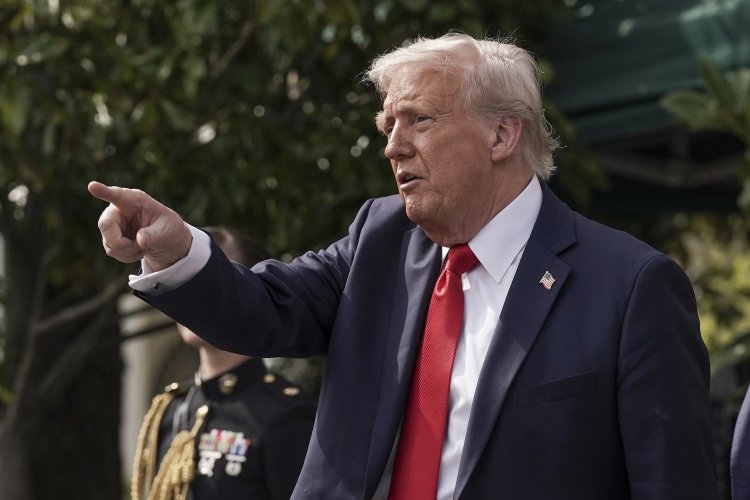New battleground in trade war: Washington considers removing Chinese firms from Wall Street
This action may occur at a delicate time. The trade war has already unsettled the markets, and widespread delistings could further alarm investors.

As the White House intensifies its implementation of significant tariffs against China in an effort to reshape global trade, administration officials and supporters of the president are increasingly focusing on the possibility of delisting the nearly 300 Chinese companies currently trading on U.S. exchanges.
Treasury Secretary Scott Bessent noted that “everything’s on the table” when asked about this issue last week. Kevin O’Leary, a prominent figure from “Shark Tank” and a staunch ally of Trump, suggested that such a move could pressure China “to come to the table” during negotiations. Senator Rick Scott, who has been concerned about the presence of Chinese companies on U.S. markets for years, views Trump’s tough approach as a chance to increase scrutiny on these entities and potentially remove them permanently.
“The U.S. capital markets are the envy of the world, providing unparalleled access to funding for companies worldwide. However, this privilege comes with responsibilities, chief among them being transparency and adherence to our financial disclosure rules,” said the Florida Republican in a recent letter to incoming Securities and Exchange Commission Chair Paul Atkins. “It is alarming that Chinese companies continue to enjoy access to American capital while refusing to play by our rules.”
The extent to which this proposal is being seriously considered within the administration remains uncertain. However, the revived focus on delisting Chinese companies highlights the aggressive strategy the U.S. is adopting against Beijing as the two countries find themselves deeper in what is likely to become a long and difficult trade war. Wall Street leaders are cautioning about the potential disruption to supply chains, investments, and hiring, even as fears of a recession linger.
“There is a nontrivial chance that we’re in a tariff-war quagmire for a long time with China,” former SEC Chair Gary Gensler stated in an interview. In 2022, Gensler played a crucial role in establishing a significant deal with China to disclose audit documentation for Chinese companies trading in the U.S., which had been consistently blocked by Beijing.
Jeremy Mark, a senior fellow at the Atlantic Council, mentioned that the U.S. is “looking at all the different levers they might have to put pressure on China — or at least in their eyes, put pressure on China — and the stock market listings of Chinese companies in the U.S. are very prominent and important.”
As of March 7, there were 286 Chinese companies listed on American exchanges valued at a total of $1.1 trillion, according to the U.S.-China Economic and Security Review Commission.
A spokesperson for the Chinese embassy in Washington stated that "as a matter of principle, China has consistently maintained that the United States should abide by international rules governing investment and trade, respect the laws of the market economy, and stop politicizing and weaponizing economic and trade issues."
"Eroding Chinese companies' confidence in investing here does no good to [the] US' own business environment," added spokesperson Liu Pengyu in an email on Tuesday. "Excluding Chinese enterprises and the Chinese market will, in the end, hurt the U.S.'s own economic interests and international credibility."
Neither the White House nor the SEC provided comments, and Treasury did not respond to inquiries.
Should the U.S. decide to push for the removal of these companies from American exchanges, various avenues could be pursued. A significant part of the discussion has centered on a 2020 law intended to empower U.S. accounting regulators to inspect the audits of firms based in China and Hong Kong. This law, the Holding Foreign Companies Accountable Act, allows for the delisting of companies if their financial documentation cannot be fully reviewed for two consecutive years. In February, Trump issued an executive order directing his administration to assess whether "adequate financial auditing standards are upheld" for these companies.
However, the law might take years to be enforced effectively, particularly if regulators struggle to obtain the necessary access. Nonetheless, alternative approaches could expedite the process.
In a recent research report, TD Cowen Managing Director Jaret Seiberg suggested that the “fastest and easiest way” for Trump to enact delistings would be through a series of executive orders executed under his national security authority.
The administration could also explore banning variable interest entities, the structure that enables Chinese companies to offer shares in the U.S., Seiberg noted. This structure provides U.S. investors only indirect exposure to the Chinese company. Trump’s February order included a mandate to review the variable interest entity structure.
However, any actions taken by the administration could come at a sensitive time. The markets have already been unsettled by Trump’s tumultuous trade wars, and large-scale delistings could further alarm investors. Analysts at Goldman Sachs have estimated that restricting U.S. investors from engaging with Chinese stocks could trigger approximately $800 billion in "liquidation selling."
“The potential for market disruption in the current market conditions could be significantly greater than when the agreement with China on access to audit papers was negotiated in 2022, especially without adequate time for a transition,” observed Katherine Martin, a managing director at Rock Creek Global Advisors and former member of the SEC’s Office of International Affairs.
James del Carmen for TROIB News
Find more stories on Business, Economy and Finance in TROIB business












